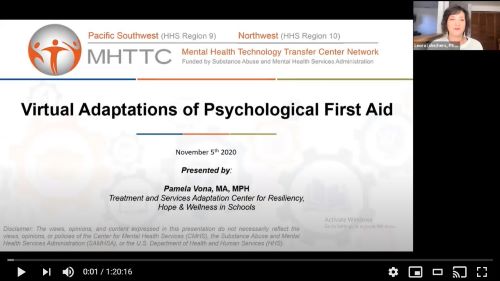
Psychological first aid (PFA) began as a tool to help first responders cope with victims experiencing trauma on the scene. There are several models of PFA, but Psychological First Aid - Listen, Protect, Connect (PFA - LPC) was developed in response to a series of school shootings in the 1990s. The five-step crisis response strategy was intended to guide teachers and staff members in helping traumatized students deal with the aftermath of senseless violence. PFA-LPC helps educational staff support students through the process of recovery, especially when students encounter traumatic reminders of being in danger or of experiencing loss or trauma. Virtual adaptations to this work will be addressed.
Objectives
Resources
 Pamela Vona, MA, MPH, is currently the Program Manager for the Treatment and Services Adaptation Center for Resilience, Hope and Wellness in Schools. Her interests include understanding how to support the implementation of trauma practices in the school setting. Specifically, her work has focused on how web-based platforms can support training in and implementation of evidence-based practices in schools. Ms. Vona served as a lead developer of the Trauma Responsive School Implementation Assessment—an online assessment designed to help schools improve their trauma-responsiveness. She is also leading the development of the Trauma Informed Skills for Developers (TISE) curriculum designed to enhance educators’ trauma knowledge and skills. Ms. Vona serves on the School Committee Workgroup for the National Child Traumatic Stress Network (NCTSN) and previously was a member of the NCTSN Policy Task Force.
Pamela Vona, MA, MPH, is currently the Program Manager for the Treatment and Services Adaptation Center for Resilience, Hope and Wellness in Schools. Her interests include understanding how to support the implementation of trauma practices in the school setting. Specifically, her work has focused on how web-based platforms can support training in and implementation of evidence-based practices in schools. Ms. Vona served as a lead developer of the Trauma Responsive School Implementation Assessment—an online assessment designed to help schools improve their trauma-responsiveness. She is also leading the development of the Trauma Informed Skills for Developers (TISE) curriculum designed to enhance educators’ trauma knowledge and skills. Ms. Vona serves on the School Committee Workgroup for the National Child Traumatic Stress Network (NCTSN) and previously was a member of the NCTSN Policy Task Force.
The Northwest MHTTC and the Pacific Southwest MHTTC are continuing our partnership to provide and extend deeper technical assistance on the Interconnected Systems Framework (ISF).
Interconnected Systems Framework (ISF) is a structure and process that maximizes effectiveness and efficiency by blending the strengths of school and community mental health with strengths of the multi-tiered framework of PBIS (Barrett, Eber, Weist, 2013)
This past year, we offered three webinars on the Interconnected Systems Framework (see below for recordings) and followed the learning series up with monthly discussion hours led by Susan Barrett and field leaders from our region.
This year, we are offering more programming to deepen your ISF work and contextualize ISF to this moment of COVID-19 and beyond. Our fall offering is made up of four modules and ends with a town hall for you to be able to ask faculty your questions and resource one another. Each module includes teaching from Susan Barrett and field leaders on ISF systems, and USC faculty on ISF practices.
Want more information and school mental health resources? Visit the Northwest MHTTC's School Mental Health page and sign up for our monthly newsletter for regular updates about events, trainings, and resources available to the Northwest region.